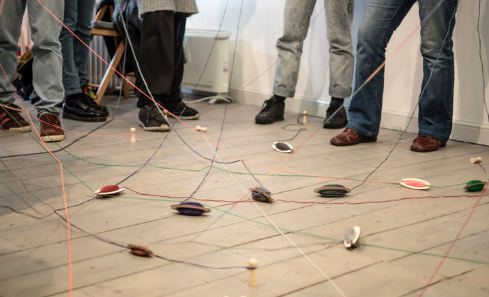
Crypto-Knitting Circles is a collaboration between artist Ailie Rutherford and designer Bettina Nissen with Swap Market in Govanhill and Platform in Easterhouse, Glasgow to develop the idea of a feminist cryptocurrency.
Here, we spoke to Ailie about the project, which was funded by the University of Edinburgh and the National Lottery though our Open Project Fund.
We are looking at how we can combine feminist thinking and community economies with blockchain technologies and asking whether new digital technologies offer the potential to create fairer grass-roots exchange networks.
Our year-long research project began with workshops in Govanhill and Easterhouse, using the format of the “knitting circle” where we learn from each other, playing on the similarities between knitting patterns and the encryption codes or trust networks of blockchain technology.

We are running a series of open workshops throughout the year and Chain Re: Action - a knowledge exchange event at Platform this June.
Chain Re: Action invites local residents, artists, academics and activists to exchange ideas on how we can use new technologies to create a different type of economy, designed for and by the people who would use it. If a cashless society is inevitable how do we create one that works for us?
And how can we ensure that the gender, race and class biases of today are not coded into the digital economy of the future.
The event will feature talks from Swap Market staff, The Wellbeing Economy Alliance and Ubuntu Women's Shelter looking at how we put feminist economics into practice in the real world. We’ll have interactive artworks, film and discussions with people working on cryptocurrencies and using blockchain technology for social good.

Ultimately the aim is to co-develop a proposal for a blockchain system that puts feminist principles into practice developed by and for the people who would use it.
This first twelve months is very much a research phase of what we hope will become a longer term piece of work.
Bettina and I met at a workshop at Edinburgh University, looking at the potential for blockchain technologies to create new networks and different systems of value. We are both very interested in how these new technologies might be applied in a way that disrupts existing power structures to democratise the systems that control our lives.
Bettina had previously worked on a project with the New Economics Foundation, called After Money, engaging audiences with complex technological concepts and data through tangible means. Through my work on The People’s Bank of Govanhill; a long-term collaborative community currency project in Glasgow I had begun thinking about the potentials of working with the blockchain in a way that would centre the voices of those who are directly impacted by the outcomes of the design process. It seemed like a natural fit for us to work together.
My interest in feminist economics peaked when I moved to Glasgow in 2014 and was doing a bit of research at the Women’s Library, co-inciding with my residency at Govanhill Baths. I came across writing by Swasti Mitter, Silvia Federici and Marilyn Waring; their criticism of the gendered division of labour, the historic exclusion of women and their work from the dominant economic system, the consistent de-valuing of subsistence production, reproductive labour and much of the everyday economic practices supporting our lives that regularly go unacknowledged under capitalism.
The need to radically re-think how we function economically has been the driver behind The People’s Bank of Govanhill and Swap Market projects.
I’m particularly interested in how we can learn from community currency projects in other parts of the world. At the moment we are making connections with El Cambalache; a feminist moneyless exchange project in Mexico with similar aims and intentions to ours. We’ll be screening a documentary on their work at Platform in June.